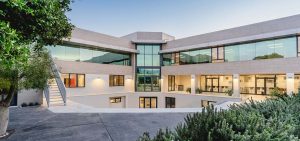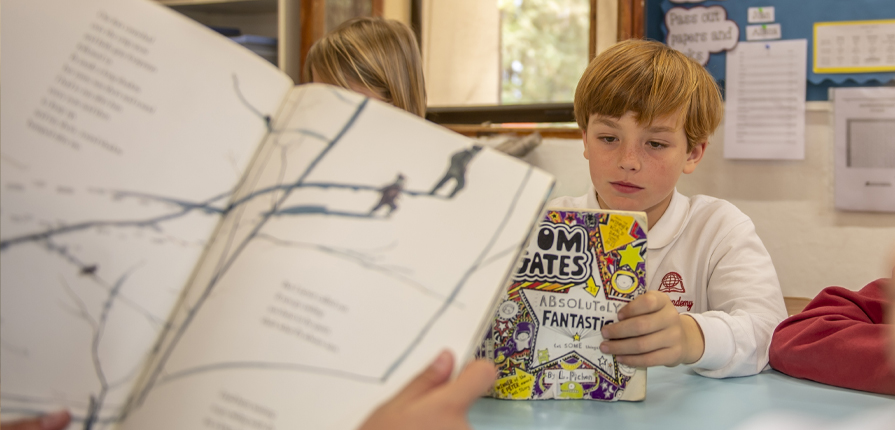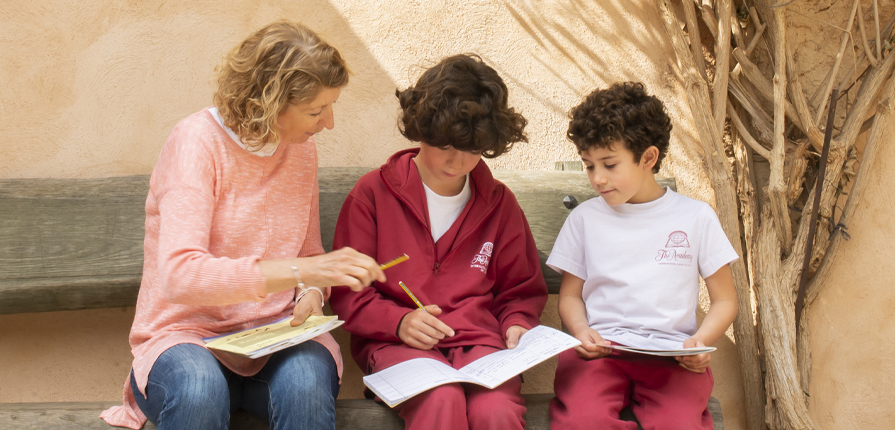Primary
Key Stage 1
This information provides an overview of the curriculum for students at this stage of their education here at The Academy. Before moving on to Key Stage 1, which covers Year 1 and Year 2, the children will have been enabled to develop basic reading, writing and mathematics skills.
Throughout Key Stage 1, the children will have been developing their social, emotional and personal skills allowing them to begin working more independently. They will have also taken part in guided tasks helping them to develop the research and study skills they will need for their future education.
The developing curriculum will allow for a more formal introduction to literacy and numeracy skills. Children will learn to write independently, developing more accuracy in grammar and punctuation. They will begin to calculate mentally more effectively and they will be able to identify simple problems and develop effective solutions. In this Key Stage, their form tutors continue to teach most subjects and continue to be the main point of contact with parents. The subjects listed below are supplemented by lessons and activities related to personal, social and emotional aspects of learning and other creative areas including gardening, drama and cooking.

Subjects taught in Key Stage 1
- Art and Design:
Art and Design is integrated into various aspects of the curriculum and provides the opportunity to develop creativity and imagination. The children work with different media such as oil pastels, chalk, watercolours and acrylics and also create 3D sculptures using junk material, clay and various modelling materials.
- Computing:
Children learn how to use technology to create, organise and store digital content. They develop mouse and keyboard skills and are taught to store and retrieve their work. They learn about common uses of information technology beyond school and how to use technology safely and respectfully.
- English:
- Geography:
Children develop knowledge about the world, the United Kingdom, Spain and their own local environment. They begin to use geographical skills and resources including maps and plans to learn more about different people and places around the world.
- History:
Children develop an awareness of the past and begin to acquire a vocabulary of every day historical terms. They learn about important historical events and the lives of significant individuals in history. This inspires them to develop curiosity to find out more about the past, to ask perceptive questions and to begin to think critically.
- Maths:
In Key Stage 1, the children develop their conceptual understanding of numbers and build their confidence and mental fluency in all areas of maths. They learn to use the four basic operations, beginning by using practical resources and moving onto more abstract calculations. They learn counting, sequencing, mental maths, mathematical language and problem solving through hands-on activities, exploration, and reasoning. They also learn to describe and compare different quantities such as length, mass, capacity and time and money and to sort and talk about the properties of shapes.
- Music:
Students are taught to sing, to join in with and create rhythms and to play percussion and musical instruments. They explore sounds and create their own short compositions. They listen and respond to a wide variety of music.
- Physical education:
Children are encouraged to use their natural enthusiasm for movement. They learn to work in pairs and small groups while extending their coordination, agility and balance.
- Science:
Children learn about scientific investigation, life processes, living things, materials and their properties, and physical processes. They develop their understanding of scientific ideas by observing changes over a period of time, noticing patterns, grouping and classifying things and carrying out simple comparative tests. They are encouraged to be curious, ask questions about what they see, explore and discover.
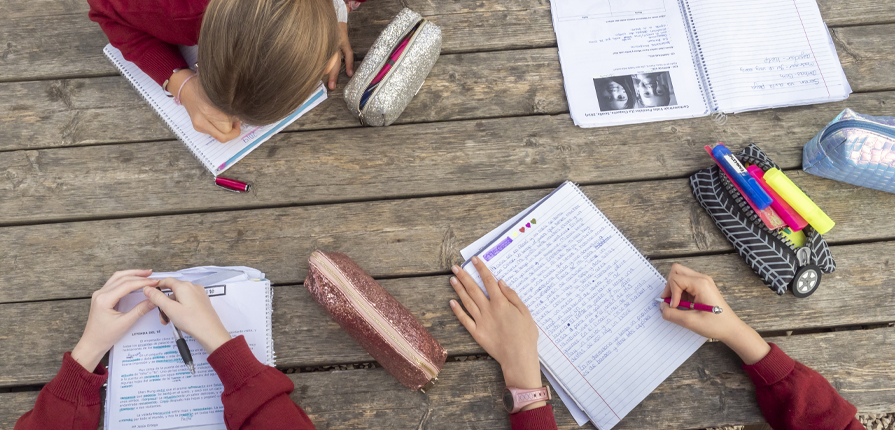
Subjects taught in the spanish system
– Spanish as a first language:
Children develop their vocabulary and grammar through a variety of topics.
– Spanish as a second language:
The main objective of teaching Spanish as a foreign language is to develop the linguistic capacity of children: in oral language, listening comprehension, reading and writing.
– Catalan:
Alphabet, sounds, spelling, vocabulary and writing.
– Knowledge of the environment:
Study of the natural sciences, geography and history.
– Balearic Culture:
Balearic culture is a subject designed to increase children’s knowledge of the culture, society and history of the Balearic Islands.
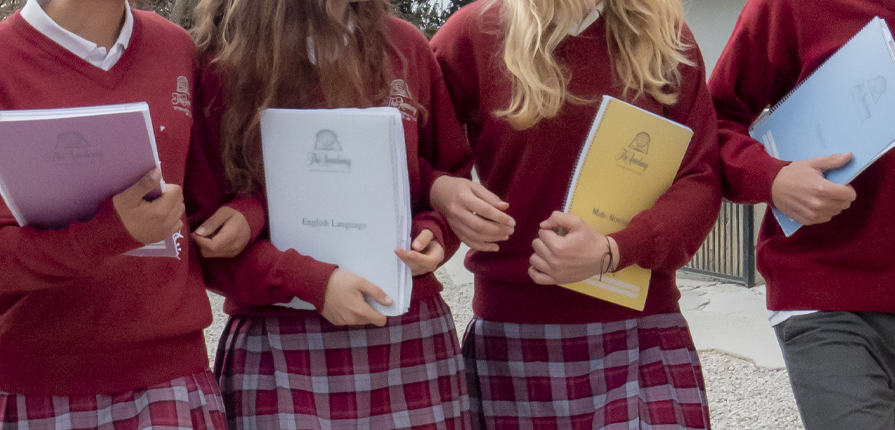
Key Stage 2
Moving into and through Key stage 2, the children begin preparing to become more independent learners. Through their lessons, teachers encourage collaborative work, critical thinking and a problem solving approach. The children take part in guided tasks helping them to develop the research and study skills they will need for their future education
In this Key Stage, their form tutors continue to teach most subjects and continue to be the main point of contact with parents.
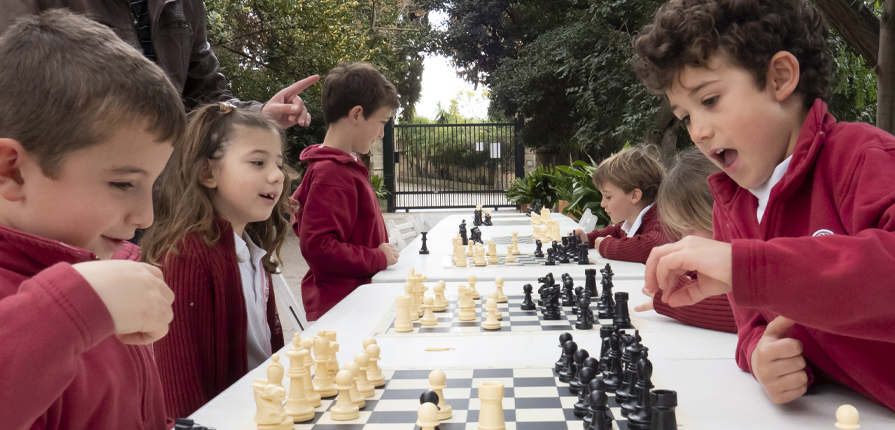
Subjects taught in Key Stage 2
- Art and Design:
In Key Stage 2, the children are encouraged to develop their techniques, including their control and their use of materials. They work on improving their mastery of art and design techniques, including drawing, painting and sculpture with a range of materials like pencil, charcoal, paint and clay and expand their knowledge about great artists, architects and designers in history.
- Computing:
Through computing classes, students learn to access information, save it, share it with others and adapt it to their own needs. They learn to select, use and combine a variety of software (including internet services) on different digital devices to design and create programs, systems and content that accomplish given goals, including collecting, analysing, evaluating and presenting data and information.
–
- English:
In English classes in Key Stage 2 children continue to increase the breadth and depth of their reading, making sure that they become independent, confident and enthusiastic readers who read widely and frequently. Their exposure to and enjoyment of stories, poetry, plays and non-fiction is extended, which increases their fluency as readers, their facility as writers, and their comprehension skills. They learn to justify their views about what they have read and discuss the content with others, which later enables them to participate confidently in a range of public speaking, performance and debate activities. We continue to use the Talk for Writing approach to develop their knowledge of language, their understanding of the audience and the purpose of their writing, and the ability to select appropriate vocabulary and grammar. This enables the children to become proficient writers, ready for the next stage of their education.
- French or German:
In Key Stage 2 the children have the option of learning another modern foreign language. The classes are planned to include interactive activities that encourage reading, writing, spoken language and listening comprehension.
- Geography:
Geography is about developing knowledge, skills and understanding of peoples, places and environments at different levels, both in the UK and abroad, and provides an understanding of how places are related to each other and within a global world. The children learn to use maps, atlases, globes and digital/ computer mapping to discover the location and characteristics of a range of the world’s most significant human and physical features. They also use fieldwork to observe, measure, record and present the human and physical features in the local area using a range of methods, including sketch maps, plans and graphs, and digital technologies.
- History:
Children continue to develop a chronologically secure knowledge and understanding of British, local and world history and develop an appropriate use of historical language and terms. They are encouraged to ask questions about change, cause, connections, similarity and difference, trends over time and significance. They use different types of information and a range of sources, including digital resources, to investigate the past.
- Maths:
In Key Stage 2 the children extend their understanding of the number system and place value to include larger numbers. They develop connections between multiplication and division with fractions, decimals and percentages and become proficient in calculations in the four basic operations of arithmetic including long multiplication and long division. The children develop their ability to solve a wider range of problems, including increasingly complex properties of numbers and arithmetic, and use a variety of mathematical language, tables, and diagrams to discuss and present their work. They develop efficient written and mental methods of performing calculations accurately.
- Music:
In music, children learn to sing and play instruments with confidence, skill, expression and an awareness of the importance of their contribution to group or class performances. They learn to improvise and develop their musical compositions. They explore their thoughts and feelings by responding to a variety of different kinds of music from different times and cultures.
- Science:
The principal focus of science teaching in Key Stage 2 is to enable pupils to develop a deeper understanding of a wide range of scientific ideas. They do this through exploring and talking about their ideas; asking their own questions about scientific phenomena; and analysing functions, relationships and interactions more systematically. They learn to answer questions in science using different types of scientific enquiry, including observing changes over different periods of time, carrying out comparative and fair tests and finding things out using a wide range of secondary sources of information. Children are taught to draw conclusions based on their data and observations, use evidence to justify their ideas, and use their scientific knowledge and understanding to explain their findings.
- Physical education:
In Physical Education children learn essential life skills such as teamwork, cooperation, and a competitive spirit which will help them to lead active and healthy lives as they are growing up. Throughout this key stage the children enjoy playing games and applying basic principles suitable for attacking and defending. They learn to apply and develop a broader range of skills, building up their strength and flexibility, and enjoy collaborating and competing with each other.
Subjects of the Spanish Department
– Spanish as a First Language:
Spanish is taught three times a week in Key Stage 2. The contents of the subject are divided into 6 different training areas: reading comprehension, grammar, vocabulary, spelling, literature, oral language and writing.
– Spanish as a Second Language:
According to the curriculum, the teaching of a foreign language in Key Stage 2 Cycle offers different opportunities for children to gradually become familiar with the sounds and writing of Spanish, developing language skills, understanding and communicating in Spanish, increasing their vocabulary, practicing grammatical rules in the language they study, making comparisons between Spanish and their own language, making connections with other disciplines and using the language beyond school, to participate in other Spanish communities.
– Catalan:
Catalan is taught once a week in Key Stage 2. These levels are the equivalent of grades 2, 3, 4 and 5 in the Spanish primary system respectively. Students who have Catalan as their mother tongue have extensive knowledge of writing and reading in Catalan.
– Knowledge of the environment:
The subject of Conocimiento del Medio is taught once a week in Key Stage 2. This is a multidisciplinary subject that mixes social and natural sciences.
– Balearic Culture:
The teacher helps students integrate into the Balearic Islands Community by learning about the values, beliefs, habits and expectations of the society that welcomes them and in which they live.


